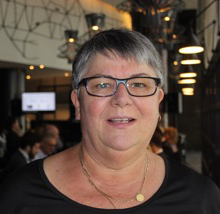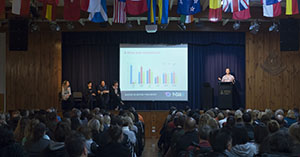
Photo: Parentguides.com.au
In 2004 I wrote a book on the Internet and I made somewhat of a prediction. Call me Nostradamus. In the book I said there was a new world and I called it rather pathetically, Siberia. I said your children were early settlers in this new land and that this was potentially problematic because a lot of parents were standing on a metaphorical dock, waving goodbye to their children as they explored it.
I also said that I didn’t think staying on the dock was a very good idea because in Siberia what looks like a bank can sometimes be a robber. What looks like a friend can be a predator, and what looks like a game could be a trap. These are the pitfalls of the Internet and social media.
I think we, as parents, have to get over to Siberia. We have to learn the language, the cultures, the morays and it’s more important than ever because the elephant in the room of course is what happened recently at Brighton Grammar and at Melbourne Grammar. That has to be named and there but for the grace of God go all of you reading this. Thankfully, as a Melbourne Grammar parent, I dodged that bullet — my son is now 25 — but it could have been him. It could have been any of our kids.
The “Perfect Storm” of Social Media
Bill Belsey was the 5th-grade Canadian teacher who first used the term “cyber bully”. And I met him at a conference a few years ago and he talked to me about the perfect storm. The perfect storm meaning the fact that your daughter’s brains will only be fully developed on a good day and with the wind behind them at 23 years of age, and that the typical boy 27 … if you’re lucky.
What you have to understand is they’ve all got immature brains that aren’t flash on impulse control. A unique characteristic of the boys at Brighton Grammar and Melbourne Grammar was their inability to predict the consequences of their actions, and for the record, no; I don’t think they should have been expelled.
The perfect storm though is not just this immature brain but also technology that is in the moment, of the moment. And that is, it’s just the press of a button and you can have the same broadcasting power as Rupert Murdoch. This is not a game and when you are told by experts that kids under 13 should not have social media, you have to think about the kind of trouble that they can get into; life-long trouble.
I’ve been working as a psychologist for 31 years and I’ve never met a kid under 13 who has the social, psychological and cognitive maturity to fully manage a digital footprint and I am yet to meet one. When I hear that there are seven and eight and nine-year-olds in this community who are on Facebook I really wonder about the sanity of those parents. It’s a hell of a big risk to take.
Some Interesting Social Media Statistics
Did you know that the average 18 to 25-year-old checks their phone 56 times a day? That’s once every 15 minutes. And a lot of people go, “Oh God, it’s terrible” but in fact that’s what they do. But lets NOT have the moral panic about technology. We had one in 1839 about this disgusting habit that young women had of novel reading. We’ve had another moral panic around jazz music, and then one around TV, and, of course, video games and now it’s social media. We all need to do is take a big, deep breath.
I recently presented a paper on whether toddlers should use iPads and did a thorough investigation of the literature. The research says it makes absolutely no difference to a child’s enjoyment of a book if it’s read to them on a Kindle, an e-reader, or an iPad. It makes absolutely no difference.
What else do we know? Nine out of 10 teenagers tell us they’re using their phone while spending quality time with their parents. I’m not quite sure how that works. Seven out of 10 teenagers tell us they’re using their phone while hanging out with friends. That’s not at all unusual. Three out of 10 teenagers tell us they’re using the phone while crossing the road, obviously an extremely unwise thing to do. Five out of 10 teenagers tell us that they’re using their phones while eating at restaurants.
Food and communal time, particularly in families, is so important. One of the great protective factors in families is eating a meal together without technology. Have you read the research on what happens when families get together? Kids learn greater language skills; they have a greater likelihood of a good VCE score and have a reduced likelihood of using illicit drugs. The research is crystal clear and yet we have a decline in the number of families who are actually managing to do this.
We’ve got a really interesting situation. We had the “us” generation that basically grew up without knowing about computers and then we’ve got this new mob who basically don’t make a distinction between an on and offline world. So when you hear the statistics about how much they’re using – the 56 times a day – don’t judge, just relax. There is no firm evidence at all that kids language skills are deteriorating or that they’re all becoming sociopathic monsters or that they’re less happy. The evidence is just not there so it’s important to adjust.
So here we have a device, which basically weighs 155 grams and has basically infiltrated every aspect of our kid’s lives. Some of you will know about Maslow’s hierarchy of needs. We have to change that a little bit now because things have become a little bit different. We know that Wi-Fi is very important to kids, but even without it, our kids are part of a generation that is, as Time Magazine said, “never offline”.
Practical Tips & Tools For Parents
It’s so important for parents to regulate. You’ve got cyber bullying, social networking, sexting, mobile phone security, offensive or illegal content and this is the main message that I wish to send to you. Please, stick to the age restrictions for each individual platform of social media. They’re there for a reason and the age limits are sensible.
So of course many of you will say, “But Michael, I’ve already let my kid do this.” Well there’s no time like the present to find your digital spine. Setting limits and boundaries is a beautiful thing. If you want someone to blame, say, “It’s that nasty Dr Michael Carr-Gregg. You can see him on Sunrise.” I don’t care. Remember I did write The Princess Bitchface Syndrome and that got me into lots of trouble.
So how much is too much time online? I think it’s really simple. As a parent or guardian, if you think that your child’s behaviour online is having a negative impact on other aspects of their life, it’s too much time and you have to step in. The number of hours young people spend online varies significantly and there is no guideline for the perfect amount of time kids should be online.
There is some technology that I love though. Cold Turkey is a free program you can download onto your PC. The Mac equivalent is called Self Control. These platforms basically block social media for set periods of time. They’re free, pretty simple and pretty straightforward. Why wouldn’t you use them? If your kids object just remind them, your house your rules and the door is there if you don’t want to live here. It’s really simple.
Make sure that you’re setting those limits and boundaries and negotiate consequences. I recently had parents in my office, their child did something monstrous and they said, “Right. No phone for six weeks.” Ah! I need to roll that back a bit. Six weeks is way too long. So the punishment must fit the crime. This kid’s crime warranted may be two days of no phone but instead, dad gave it back early. United you stand, divided you’re cactus. So you’ve got to understand we teach people how to treat us, and if you can’t get a consensus they’re just going to make hay while the sun shines so enforce your rules.
Talk to your Internet service provider about getting hold of a random Wi-Fi password generator. A new password every day is another beautiful thing. You know, “Whack up this. Empty dishwasher. Fold laundry. Vacuum, dust, take out the trash, then you can get it.”
If there was one fantastic website that all parents should investigate on this subject — a sort of cyber safety holy grail — it would be iParent from the Office of the eSafety Children’s Commissioner. They keep the site up to date every single second of the day and they have a huge staff that enables them to do that. It’s a really useful source of information for parents to keep up to date with what’s happening in this area.
With respect to cyber bullying I want to tell you a quick story. A few years ago I was sitting in the Channel 7 Sunrise green room with Charlotte Dawson. I remember sitting with her and she was talking to Mel and Kochie – it was that long ago – about the whole issue of being trolled online. We had a discussion and I said, “Do you actually respond?” and she said, “Yes, I respond.” I said, “Oh, I don’t think that’s such a good idea.”
Charlotte, as many of you surely know, is now dead.
What we have to do is use stories. We have to tell our children stories. You don’t reply to a bully. You don’t feed the trolls. What you do is block the person. You save the evidence. You report the abuse. If it’s criminal, you tell the police and as a community, we all have to take responsibility for what our kids do.
I’ve got these four Ps for social media. Never post anything online that you wouldn’t want your Parents, the Police, a Principal or a Predator to see. It’s as easy as that and it’s a fantastic rule for social media. Start the conversation way before your kids are even beginning to get online. That, to my mind, is a very smart move for parents to make.
Pornography, Sexting & Sexual Abuse
One out of 10 teenagers tell us that they’re using their phone while having sex. Sexting. I just find it extraordinary that many parents don’t understand this is part of courting in 2016. It’s what kids do. Is it advisable? Absolutely not. There are laws out there and kids can get themselves in a whole world of trouble.
Pornography is now the leading sex educator in Australian schools by far. It’s much more violent than it used to be too. The average age at which kids see this stuff is 11 years of age. Please don’t for one second think there’s anything that you can do to stop them from seeing it because, newsflash, there isn’t.
You might remove all technology from your home, become — I don’t know — some kind of technical lark, but they’re still going to see it at school and they’re still going to see it from their friends. So it’s very important that we have a conversation about it beforehand.
What’s sad about this though is the research shows the impact that violent pornography has toward changing our kid’s attitudes about sexual harassment. It suggests that it’s okay to hold a girl down for sex; it’s okay to be callous; it’s okay to be abusive. Pornography has little if anything to do with intimacy, love or consent.
My greatest fear is that we’re socialising boys and some girls into a very brutalised version of masculinity and I need you to note that some of my clients — young kids — have actually seen porn before they’d even kissed a girl or a boy. That is very sad. We have to be quite clear about that these days. Thankfully, there is an answer in the form of a marvellous website called itstimewetalked.com.
If ever there was a website that you need to dive into tonight on the subject of online pornography, it’s this one. Developed by Maree Crabbe (from It’s time we talked). It’s a genius website to equip parents with the skills, knowledge and strategies they need to deal with this issue. It’s not a matter of if, it’s when they see it, and you need to be ready. Do I wish it were different? Of course I do, but this is our reality.
A Parting Thought…
Okay. So I’m going to leave you with one final thought. Young people are all online. They need to learn the skills, the knowledge and the strategies to use the Internet in a safe, smart and responsible way. This is not something you can outsource to your school. You had all the fun of procreation but now, as a parent, you have to step up to the plate and deal with it.
My colleague, Greta Bradman and I are seeing kids every single day with problems relating to the Internet. We often spend time talking to parents about what they need to put in place. Please let it not be the case that we have to talk to you after a sudden disaster. Be proactive, have these conversations now.
This is an edited text of our parent panel night at Firbank Grammar about cyber safety. Social Media 101 was collaboration between Firbank and Parent Guides.



